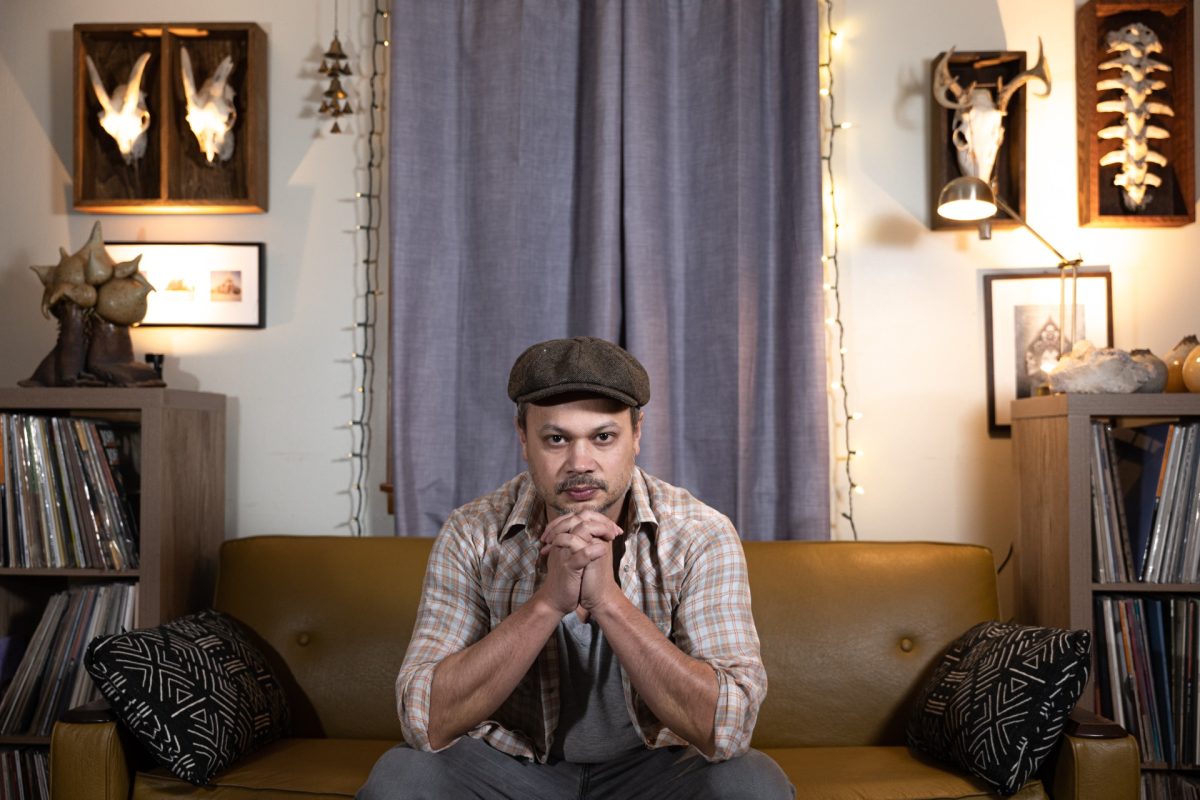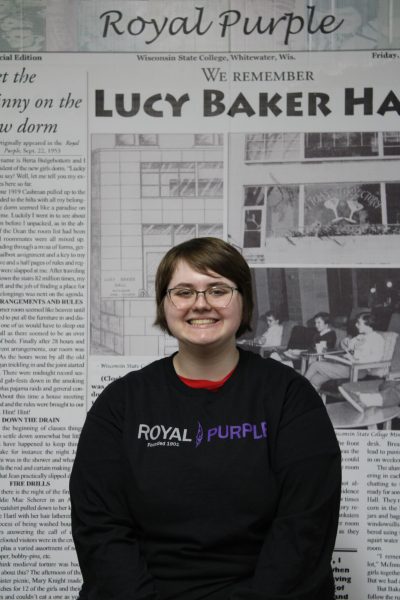Some people take up hobbies that ultimately change the direction of their lives. No matter the discipline, countless people have spent years, even decades, perfecting their craft.
UW-Whitewater Associate Professor Nicholas Gulig is one such person. Gulig’s hard work in poetry paid off enormously, as he was named Wisconsin’s poet laureate for the 2023-24 term.
Gulig’s passion for poetry stemmed from a mix of two factors from his youth. Gulig stated that when he was a child growing up in Eau Claire, Wisconsin, his father would work multiple jobs to make ends meet. Because of this, Gulig saw him sparingly.
“I would try to stay up as late as I possibly could because he would always come in and say goodnight to me,” Gulig said. “If I was awake, he would come in and read. And oftentimes, he read poems to me.”
Gulig’s father loved to read and collected books, a lot of which contained poems.
“I grew up listening to poems in a really meaningful context because I didn’t see him a lot,” Gulig said. “Poems became this thing where really, they were a window to my dad.”
The other factor that played into Gulig’s passion for poetry was what he described as empty calories. Gulig explained that songs, movies, television shows and other aspects of culture all felt the same.
“Because I had a need for culture, but I didn’t have anyone making culture that felt like it was worth anything, my friends and I had to make it ourselves,” Gulig said. “So, that’s what I was doing at that developmental moment in my life, was making art because what I was being asked to consume was just so empty.”
Gulig began seriously writing poems during his teenage years, around the ages of 12 or 13. But, while working on his doctoral dissertation in Thailand, Gulig realized something startling about his cultural consumption habits.
“The only English-speaking station on television was Al Jazeera English. They were covering the war in Syria basically 24/7,” Gulig said. “Then, it started to feel weird because I started to realize that I was kind of interacting with that news feed the way that one would interact with television.”
As a result, Gulig felt that his responsibility as an American writer was to work with these elements outside of his home country. Gulig further explained that his poems are not dictated by typical categories of literature.
“I don’t approach writing through the lens of genre or style so much as I do through the lens of whatever set of concerns I have,” Gulig said. “And then those concerns then dictate what the poems need to be and how they need to be organized.”
As such, Gulig’s books are often dealing with questions and unknowns. In Gulig’s book called “Orient,” he focuses primarily on how artists work with subjects involving suffering that is not their own.
Gulig’s second book, “The Other Altar,” is much more personal. While living in Thailand, Gulig’s father passed away, and he took his experience with grief and reflected on how this feeling can result in isolation and self-absorption.
“I think dangerous consequences of grief is that it risks centering ourselves. It makes us feel like we’re the center of the world,” Gulig said. “I think the question is, ‘how do I go through that and turn grief into something that connects me to other people? How can grief become like a bridge instead of an island?’”
Gulig credits poetry for leading him to where he is today, specifically regarding his education. Gulig stated that poetry is the reason why he pursued higher education, first at the University of Montana, then at the University of Iowa and finally, at the University of Denver.
Through his studies at the University of Iowa, Gulig did a Fulbright fellowship in Thailand. Additionally, Gulig expressed that he loves teaching students and is grateful to do what he loves.
“I get to live a life where I do what I love. And that’s actually pretty rare,” Gulig said. “So, I feel really grateful for the life that I have. I end up back there as a young kid, listening to my dad read poems to me.”
Wisconsin selects a new poet laureate to serve a three-year term. The poet laureate takes on a multitude of responsibilities, such as doing interviews, promoting poetry and coming up with a project.
Gulig’s project was inspired by Lorine Niedecker, a poet from Fort Atkinson, Wisconsin. Gulig and his friends recreated Niedecker’s voyage around Lake Superior in honor of her. This project, however, turned into something bigger.
“PBS Wisconsin wanted to turn that into a longer documentary,” Gulig said. “So, it’s about my life as a poet and her life as a poet, and then about this trip I took in honor of her life as a poet.”
Upon finding out that he was named the poet laureate, Gulig immediately thought of his father. After his father passed away, Gulig took all his father’s books, one of which was by poet Robert Frost.
Inside the book, Gulig found a note from his father’s first love that revealed something about his father.
“At some point, he had told her that he wanted to be a writer. My dad needed to provide for his family, so instead of being a poet, my dad worked three jobs so I could have a life,” Gulig said. “So, in my mind, the story I always tell myself is that my dad gave up on his dream of being a poet so that I could be a poet.”
Gulig expressed that when he learned of his selection, he wished that he could call his father to tell him the news. Gulig credits his father for allowing him to live his dream.
Gulig realized during his tenure as the poet laureate that he was indebted to many individuals.
“The position forced me to return to that and to really think about why I’m a writer,” Gulig said. “When you start telling other people those stories, you’re really telling yourself that story again.”
Hannah Keziah Agustin is a UW-Whitewater graduate who worked closely with Gulig throughout her undergraduate career. Keziah Agustin explained that Gulig gave really detailed feedback and encouraged her to get involved outside of the classroom.
“He cares about people, cares deeply about the world,” Keziah Agustin said. “I’ve been on the receiving end of his generosity [during] my undergrad, even now. So, I’m really, really grateful for that.”
Keziah Agustin also shared some of the most important lessons that Gulig taught her.
“Just the things he taught me morally [and] ethically about what the duty of a poet is and the responsibility one has to the world,” Keziah Agustin said.
Outside of writing poems, Gulig likes to collect records. This passion turned into a home renovation project, as Gulig built an extension on his house to store all the records he owns.
Not only does Gulig immerse himself in his hobbies during his free time, but he also continues to learn new things.
“I’m really interested in learning how to do things I don’t know how to do,” Gulig said. “I love that process of not knowing something, but there’s a need to know it. So, you learn, and then you accomplish it.”
Gulig names making doorways, gardening, framing walls and building fences as just some of the few projects he has taught himself over the years.
Gulig also reflected on the need to have a teacher, regarding both poetry and other outside endeavors. After writing without any outside help for so long, Gulig eventually realized that he needed to learn from those who are more knowledgeable.
Likewise, Gulig said, the same is true for any project outside of poetry.
“You really are never teaching yourself. You’re always asking other people to teach you,” Gulig said. “Which is really just the same thing that I’ve been talking about, just in different contexts.”
Through being a poet laureate, Gulig is consistently reminded of why he teaches and also why being a teacher is incredibly important. Being a teacher is a very busy profession, and Gulig stated that sometimes, the hectic schedule of teaching makes one forget these facts.
“It’s just liberating to feel like you’re a part of something that’s so much bigger than yourself that extends so much [farther] back,” Gulig said. “That changes the way that you think about the present. Because you realize that someday, hopefully you’ll be that for someone down the road.”
Gulig’s term as poet laureate has opened so many doors for him, and he has no plans on slowing down any time soon. While writing may be seen by some as an isolating career, Gulig believes that this is not the case whatsoever.
“I can’t think of myself as a poet alone writing in a room, which is what I am most days,” Gulig said. “I’m a poet alone in the world, but I’m not. I’m indebted to all these people.”



Joyce Mondala • Feb 22, 2025 at 10:57 am
I like his suggestion of using an experience to become a bridge or an island. Zoe, you captured his essence very well.